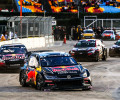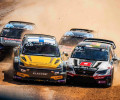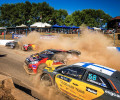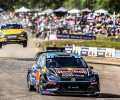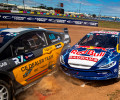From Auto#13: Crowd Pleaser
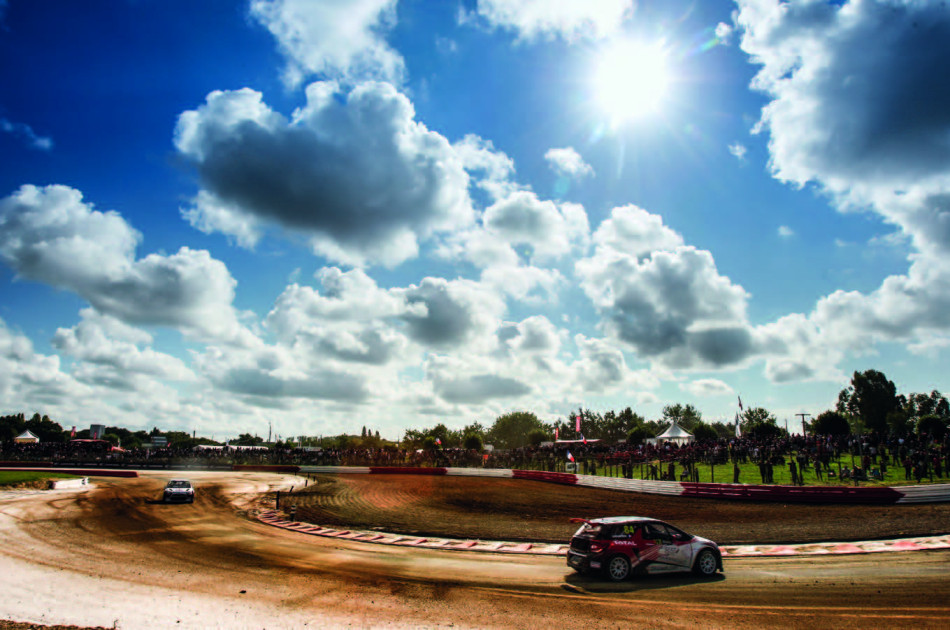
For most of the year, the French village of Loheac in Brittany, north-west France is home to around 600 people. This year in early September, the village’s centre welcomed 75,000 spectators at round nine of the FIA World Rallycross Championship.
The French event is the most visited on the World RX calendar. While Lydden Hill in the UK is regarded as the ‘home of rallycross’ and Holjes in Sweden is the sport’s festival weekend, Loheac is regarded as the ‘Mecca’ of rallycross.
It is even more significant this year as rallycross is on an upward curve in popularity since the sport’s promotion was taken over in 2013 by marketing giant IMG. Together with the FIA it turned the series into a world championship by 2014. As well as an increase in viewing figures, via both television and the internet, the sport is experiencing an upturn in on-event spectators at every round.
Yet while rallycross is growing faster than many other four-wheeled disciplines, accessibility for the fans hasn’t changed. A general admission ticket allows access to almost the full perimeter of the Loheac track and spectators have full access to the paddock after the action.
High-profile drivers like Petter Solberg, Yvan Muller and Mattias Ekström stand just feet away from the spectators’ vantage point outside the team’s awnings and such is the enthusiasm for the sport that even late in the evenings, long after the racing has finished, fans still wander the paddock.
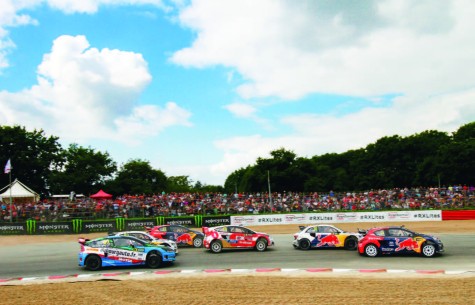
THE RIGHT MIX
The current blend of new and old, from fans to drivers, teams and circuits in the World Rallycross Championship, is providing a diverse range of experiences for the growth of the sport. The mix of circuits in World RX is that of traditional tracks such as Loheac, with new venues like the Trois-Rivières in Canada. While these new territories are all about attracting new fans to the circuits via social media, the internet and television, the more traditional venues mean the sport’s promoters are also required to maintain the support of traditional rallycross addicts.
Local hotelier Pascal Le Coguic feels the sport’s progress is evident in Loheac, but also believes that rallycross is strong in itself and not just riding a wave of high-profile names. “Just by walking in the paddock you can sense the evolution and professionalism of the sport,” he says. “Everything is a lot better organised than before, from hotel reservations to the event as a whole. There’s a higher attendance than ever, which comes with obvious financial benefits to the region.”
That formula of new mixed with old is evidently working. The sport is aiming itself at a younger demographic than the average motor racing fan – the short race format of a rallycross event is perfect for a generation more familiar with watching clips on social media than viewing longer races
For double DTM champion turned EKS rallycross team owner and driver Ekström, that aspect is a key attraction. “The way the sport is operating, with short heats, powerful cars and allowing the fans to be very close to the teams is what really attracts me,” he says. “You need something to balance out a two-hour Formula One race for kids who get bored after a 30-second Facebook clip. I really believe in rallycross as a sport, a concept, for entertainment and because value for money is high for the fans.”
In May this year, the two disciplines met at Hockenheim, giving Ekström’s touring car colleagues an opportunity to view rallycross first hand. “A lot of them think the cars are pretty fast, but they think the paddock life, like having a truck and a tent, is not DTM or F1 standard. For me, motor racing is not about the hospitality or how big your paddock facility is, it’s the racing, how much entertainment value there is and how great the cars are to drive.”
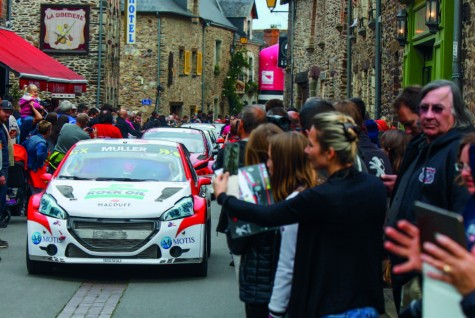
CHANGE FOR THE BETTER
Reigning World RX champion Petter Solberg thinks the level of competition in rallycross is especially high. “The last few years have been a massive step in how the sport is promoted, the teams, the development of the cars and drivers,” he says. “It’s been a huge step, but there is still a long way to go. [But] It’s not that any rally or race driver can come in and just clean the floor with everyone, it’s not like that at all. There are a lot of drivers who have rallycross experience and then you have DTM, F1, WTCC, WRC drivers – it’s no walk in the park.”
While Ekström and Solberg and their respective teams are relative newcomers to the highest level in rallycross, fellow Scandinavian Kenneth Hansen has seen it all. The head of Team Peugeot-Hansen believes that it’s imperative the sport grows while maintaining its traditions.
“We have always had a very good sport, but to make the best fruit of it, we needed someone to make it into a package. We knew that not everything would always be as we wanted, but we want the sport to grow up and really be seen by the world. For us, it has been a big, big step.”
The final word on the Loheac weekend is left to Hansen, whose team and son Timmy won in front of Peugeot’s adoring home crowd, just down the road from the marque’s nearest factory in Rennes. “To win at Loheac, in France with Peugeot and for the French people in that atmosphere at a rallycross event, it’s absolutely magic!”

 Facebook
Facebook Twitter
Twitter